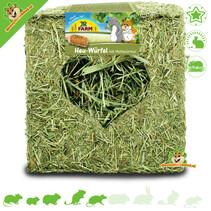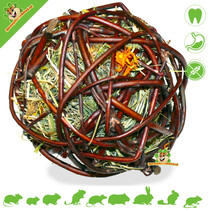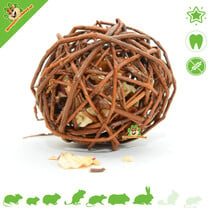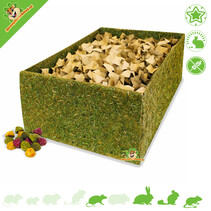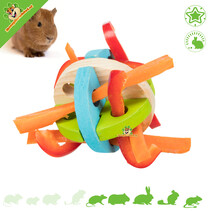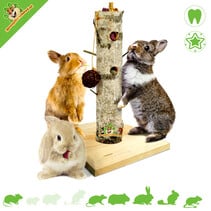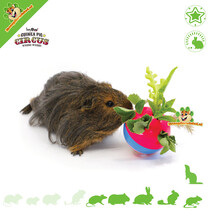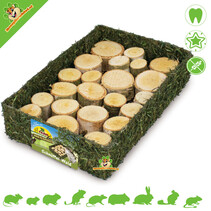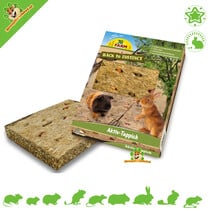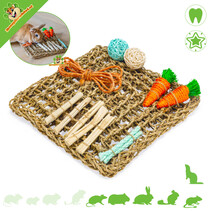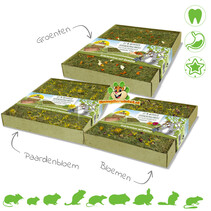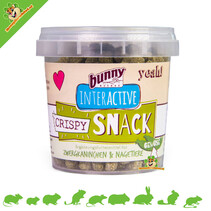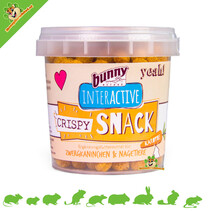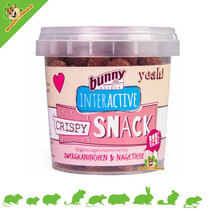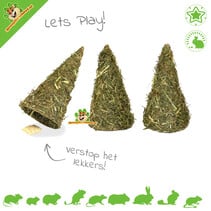Training and foraging for rodents & rabbits
- Ordered before 5 p.m., shipped the same day!
- Al 14 jaar een begrip!
- Delivery from our own stock
- Ordered before 5 p.m., shipped the same day!
- Al 14 jaar een begrip!
- Delivery from our own stock
Training & Foraging for Rodents & Rabbits!
Doing fun activities together with your pet is great fun! Did you know that rabbits, for example, are very intelligent and can learn all kinds of tricks? From playing football (nose balls) to retrieving and giving a High Five! Take on the challenge together and enjoy the game with your rodent!
Training your rodent or rabbit is a fun way to spend time together. It strengthens the bond between the animal and the owner. Through training you can really work with your rodent or rabbit. Real "quality time" with your animal!
It is very important to build up the training slowly. Of course we want the animals to like it and continue to like it! To ensure that the rodents or rabbits enjoy the training, it is important to work with positive rewards. The easiest means of positive reward is food. The moment the animal does what you intend, the animal receives a treat.
Please note: never punish your animal! Punishment (in any form) is a negative incentive. This will ensure that your rodent or rabbit will experience the training as something negative. You can never force the animal to perform a certain action! Positive reward and a lot of patience are the most important things in training. Don't train for too long in a row. Start with a few minutes. Do you notice that your animal's attention is weakening? Then stop training and try again in a few days.
A useful tool to use during training is a clicker. A clicker makes it easier for the animal to link the action to the reward. An example: you would like to teach your rabbit to stand on its hind legs on command. You came up with a command for this and it works! Your rabbit will stand on its hind legs! You say: 'good job!' and takes a piece of candy from your jacket pocket. The moment you give the treat, the reward, to the rabbit, the rabbit is no longer standing on its hind legs. The reward then comes too late. The rabbit will not understand that he is getting the treat because he stood on his hind legs. We can solve this problem with a clicker! Once a rabbit has learned to use the clicker, you can click when the rabbit stands on its hind legs. If working with the clicker has been learned properly, the rabbit now knows that a reward is coming. The rabbit must learn that the sound of the clicker means that a reward is coming. At a certain point the rabbit will understand that the click follows when performing a certain action. This way, the clicker helps with timing the reward. Of course, you can also use a word such as 'goedzo' or 'braaf' as an alternative to the clicker. However, a clicker is easier for an animal to distinguish. The animals will hear your voice much more often, and not only during training.
There are many different training games. This includes thinking games, sniffing mats, agility sets and snack balls. It's fun to alternate with different types of training games. This way we keep variation in the training and it remains challenging.
Varying training with positive rewards is extremely good for the well-being of rodents and rabbits. In addition, it is also a very fun way for the owners to really work with the animal!
Why are foraging toys good for rodents and rabbits?
❤ Stimulate natural behavior: Foraging toys imitate the natural behavior of rodents and rabbits, namely looking for food in their environment. Challenging them to search and dig for their food stimulates their natural instincts and keeps them active and happy.
❤ Physical activity: Foraging toys encourage rodents and rabbits to be active and exercise. They have to walk around, dig, push and pull to get to the rewards. This promotes exercise and helps maintain a healthy weight and good physical condition.
❤ Enrichment of the environment: Foraging toys add an element of challenge and variety to the environment of rodents and rabbits. It makes their daily life more interesting and prevents them from getting bored in a monotonous environment. This can lead to better overall well-being.
❤ Prevents Overeating: Foraging toys make the feeding process slower and more challenging. This means that rodents and rabbits have to make more effort to get to their food, which prevents them from eating large quantities in one go. This helps prevent overeating and weight problems.
In short, foraging toys for rodents and rabbits provide both physical and mental stimulation, help prevent boredom and promote natural behavior. It's a great way to improve their well-being and quality of life.



